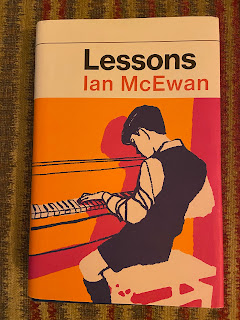'Unsheltered' by Barbara Kingsolver
If I had to make a shortlist of my favourite books, the The Poisonwood Bible by Barbara Kingsolver would be amongst them, but, unfortunately, her latest offering, Unsheltered, doesn't similarly make my cut.
The premise is intriguing: two narratives, one set in 1871 and the other a contemporary setting of 2016, united by a focus on property, a house that isn't fit for purpose. In the earlier, the crumbling house is symbolic of a wider deterioration. Thatcher Greenwood is a science teacher and advocate of Darwinism in a setting, both small town and domestic, that is not sympathetic to his calling. Willa Knox is a middle-aged woman whose life has disappointed, and whose family is facing a disintegration reflected in the structure that houses them. Both Thatcher and Willa struggle to find protection from the buffeting of external forces, although both seek solace of a different kind with Thatcher's neighbour and fellow science enthusiast, Mary Treat.
So if the symbolism is significant and the two story structure interesting, why doesn't the novel quite work? I think this is partly because both narratives fail to satisfyingly deliver. Whilst the exposure of the resistance to Victorian Darwinism is mildly interesting, Thatcher's downfall is predictable and not especially engaging. Similarly the fate of Willa's family members is not of sufficient interest to carry it's narrative thread, and the conclusion of Willa's investigations in order to save her home is wholly unsatisfying. Whilst I had a very limited engagement with Thatcher, I had even less with Willa, not helped by awkward dialogue that challenged the modern evils of environmental and social degeneration, together with criticism of a significantly flawed health care system, through large
chunks of moralising dropped into family conversation.
Faber and Faber have done a great job with the hard-back book as a product. The extension of the mouldy wallpaper print over the end papers creates a great sense of atmosphere as the book itself replicates a disintegrating home. An e-book just can't compete.
But when it comes to the final judgement of read/don't read, it is resolved for me, as it often is, by whether this book will find a permanent place on my overcrowded bookshelves or whether it is destined for the charity bag. I am genuinely sorry to say, it's the latter in this case.
Verdict: don't read.
The premise is intriguing: two narratives, one set in 1871 and the other a contemporary setting of 2016, united by a focus on property, a house that isn't fit for purpose. In the earlier, the crumbling house is symbolic of a wider deterioration. Thatcher Greenwood is a science teacher and advocate of Darwinism in a setting, both small town and domestic, that is not sympathetic to his calling. Willa Knox is a middle-aged woman whose life has disappointed, and whose family is facing a disintegration reflected in the structure that houses them. Both Thatcher and Willa struggle to find protection from the buffeting of external forces, although both seek solace of a different kind with Thatcher's neighbour and fellow science enthusiast, Mary Treat.
So if the symbolism is significant and the two story structure interesting, why doesn't the novel quite work? I think this is partly because both narratives fail to satisfyingly deliver. Whilst the exposure of the resistance to Victorian Darwinism is mildly interesting, Thatcher's downfall is predictable and not especially engaging. Similarly the fate of Willa's family members is not of sufficient interest to carry it's narrative thread, and the conclusion of Willa's investigations in order to save her home is wholly unsatisfying. Whilst I had a very limited engagement with Thatcher, I had even less with Willa, not helped by awkward dialogue that challenged the modern evils of environmental and social degeneration, together with criticism of a significantly flawed health care system, through large
chunks of moralising dropped into family conversation.
Faber and Faber have done a great job with the hard-back book as a product. The extension of the mouldy wallpaper print over the end papers creates a great sense of atmosphere as the book itself replicates a disintegrating home. An e-book just can't compete.
But when it comes to the final judgement of read/don't read, it is resolved for me, as it often is, by whether this book will find a permanent place on my overcrowded bookshelves or whether it is destined for the charity bag. I am genuinely sorry to say, it's the latter in this case.
Verdict: don't read.



Comments
Post a Comment